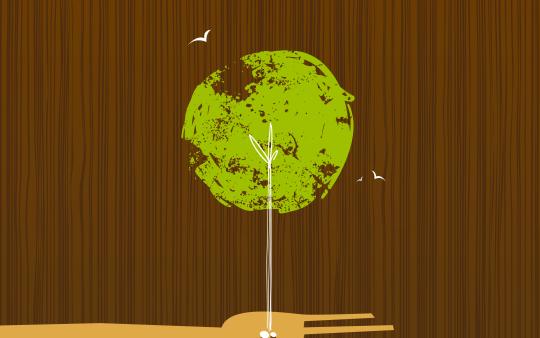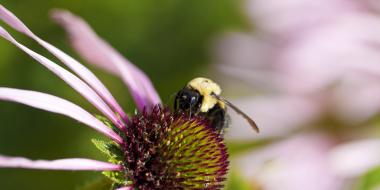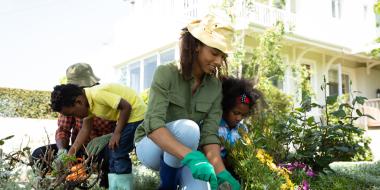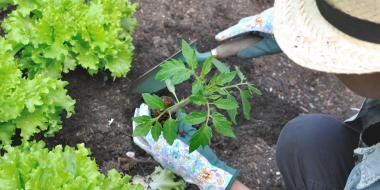With the uneasy spectre of GMOs looming everywhere and the often prohibitive cost and difficulty of accessing a good variety of organic produce, you may be thinking of giving your own garden a go. You control the conditions, the impact on the land and the methods of pest prevention. One way to make this an even more healthful and wholesome experience is to try your thumb at growing "heirloom" – also known as "heritage" – seeds. The plants from these seeds are open-pollinated – pollinated by natural means such as by insects or the wind, producing plants just like the parent plant – usually grown small-scale with traditional tending and cultivation techniques and the seeds descend directly from known lineage that traces back many decades.
We consulted with Judy Newman of Seeds of Diversity, a heritage seed-saving organization, and Tanya Stefanec of Heritage Harvest Seed, a Canadian heirloom/heritage seed mail order company, for some advice and information about these seeds and managing them at home.
What are heirloom seeds? What can an heirloom seed NOT be?
Tanya - Heirloom seeds are open-pollinated varieties that are usually 40-50 years old. The variety may be a commercial heirloom, which was introduced to the public by seed companies many years ago or the variety may be a family heirloom. A family heirloom is a variety that was initially selected by farmers and home gardeners and passed down through the generations. Many of these family heirlooms were brought to North America by immigrants during the late 1800's and early 1900's or earlier. It was very common for the first settlers to adopt Native American vegetable varieties such as corn, beans and squash. Heirloom seed cannot be hybrid or GMO or be developed lately.
Is there a distinction between "heirloom" and "heritage" seeds?
Judy - Heirloom and heritage are often used interchangeably, but heritage tends to mean a seed that has been passed down among families.
Where can I get these seeds and can I harvest them myself? How do I know they're authentic?
Tanya - Heirloom seeds can be obtained from seed saving organizations…or they can be purchased from heirloom seed companies. The home gardener can harvest heirloom seeds … [and] offspring will be the same as the parent plant if kept apart from other varieties of the same type. If you try to save hybrid seeds, the offspring will not be identical to the parent plants.
Judy - You can get these seeds at many reputable companies in Canada. If the company mentions a history with the seed they are selling, it’s generally an heirloom. If the seed is labelled “F1”, then it’s a hybrid and not an heirloom.
What benefits or virtues does heirloom seed produce have over the produce of modern seed types? Is there any disadvantage?
Tanya - Heirloom seeds generally have much more diversity than the vegetables you find in the supermarket. They come in all shapes and sizes and are often higher in vitamins. Modern varieties have been bred to be easily harvested by machinery and to store well at the supermarket. Taste and diversity are often sacrificed to provide uniform, long-storing varieties. Heirloom seeds are ideal for home gardeners who value taste, nutrition and genetic diversity.
Judy - The heritage of our cultivated plants represents an enormous accumulation of wealth, the result of generations of natural evolution, the cumulative efforts of selection by millions of gardeners and farmers from the earliest days of agriculture to the scientific breeding of recent years and the enormous amounts of time and money expended over the past few centuries of global plant exploration and collection. The advances in modern breeding and genetic engineering (whatever your views on it may be) depend on the foundation of that accumulated capital. Its value can only be comprehended by imagining what resources it would take to replace it, if that were indeed possible. Its perpetuation involves both the preservation of wild populations and plant communities within larger ecosystems and the maintenance of land races, folk and improved varieties and fortunate mutations in our farms, gardens, botanical gardens and gene banks.
Are they more difficult to grow than “regular” seeds? Does their care and propagation differ?
Tanya - I have been growing heirloom seeds for over 20 years and I find that they can handle poorer growing conditions and are tougher than modern hybrids
Judy - Modern plants tend to be bred for disease resistance, which is an advantage for you when you buy them. But they are often bred to harvest at the same time, rather than for flavour, say, which the home gardener seeks. Care and propagation of heritage varieties is the same as modern varieties, but the outcome may favour the modern variety if a disease strikes. On the other hand, heritage varieties have stood the test of time and may out-perform a modern variety in your garden!
Can my plants be contaminated by other breeds? How do I protect them and prevent cross pollination/hybridization?
Tanya - Heirloom plants can be contaminated by other varieties. Once again, every type has different isolation distances that must be followed. Two of the easier varieties of vegetables for beginners are tomatoes and beans. Tomatoes require about 50 feet of isolation from another variety of tomato and beans require at least 20 feet of isolation from another variety of bean. If a home gardener wants to save seed from many different varieties of tomatoes in a small space, then the blossoms can be bagged to prevent pollinators from transferring pollen of another variety to the variety you want to save seed from.
How do I harvest and store the seeds for planting next year?
Tanya - Every type of vegetable or flower has different requirements for harvesting and cleaning the seed. The rule of thumb for all seed is to keep them in a cool, dry, dark place till the following year.
Little compares to the pleasure of growing your own food and if you’re doing it for the health of your family and the earth, chances are you will find even greater gratification knowing that your produce has such a respectable pedigree. Local and online retailers are easily found across Canada and your garden can be as simple as a few large pots. Just don’t be like ‘a friend’ of mine (ahem) and forget to feed and water generously!
About Seeds of Diversity
Seeds of Diversity is a heritage seed-saving organization dedicated to saving, collecting, cataloguing, exchanging and educating about the diversity of heritage seeds in Canada. They are engaged in many projects that support the preservation and cultivation of these valuable and sometimes endangered varieties. For those who would like to try saving their own seeds, and learn more about growing, cross contamination, harvesting and storing seeds, check out their publications.
About Heritage Harvest Seed
A Canadian heirloom/heritage seed mail order company, Heritage Harvest Seed specializes in rare and endangered heirloom/heritage varieties of vegetables, flowers and herbs with a mission to produce non- GMO, untreated, non-hybrid natural seeds. Many hours are spent researching in order to acquire and verify the authenticity of their product. They are trusted enough to have been providing seed to many living history museums and heritage sites across Canada.






